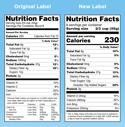Companies
Food Label Transparency Trend To Gather Momentum This Year
Report: The Emergence Of “Clean Packaging”
 A report based on an online survey on packaging trends finds that “clean packaging” is the next step following clean label and clean processing. Evergreen Packaging says need to make their packaging protect taste, freshness, and nutrients; align with ingredients; be responsible; and share values. Consumers felt that packaging should protect flavor: packaging like steel cans, aluminium cans, and plastic bottles were most cited as altering product flavor. In terms of consumer values, the environmental responsibility interests of many grocery shoppers go much deeper than the package itself and the label information. In addition to environmentally-friendly products and packaging, many shoppers expect brands and retailers to demonstrate social responsibility as a company.[Image Credit: © Daniel Albany from Pixabay]
A report based on an online survey on packaging trends finds that “clean packaging” is the next step following clean label and clean processing. Evergreen Packaging says need to make their packaging protect taste, freshness, and nutrients; align with ingredients; be responsible; and share values. Consumers felt that packaging should protect flavor: packaging like steel cans, aluminium cans, and plastic bottles were most cited as altering product flavor. In terms of consumer values, the environmental responsibility interests of many grocery shoppers go much deeper than the package itself and the label information. In addition to environmentally-friendly products and packaging, many shoppers expect brands and retailers to demonstrate social responsibility as a company.[Image Credit: © Daniel Albany from Pixabay]
Natural Antioxidants May Someday Replace Synthetics As Food Preservatives
 Consumers increasingly want clean labels: no synthetic-sounding ingredients, only natural alternatives. Now Penn State scientists have discovered that a natural antioxidant found in grain bran could preserve food longer and replace synthetic antioxidants used by the food industry, once the kinks are worked out. The researchers studied compounds called alkylresorcinols (AR), produced by wheat, rye and barley to prevent mold, bacteria and other organisms from growing on the grain kernels. They extracted and purified ARs from rye bran, then studied how well ARs were able to preserve omega-3-rich oils in emulsions. Though not yet as effective as synthetic antioxidants like butylated hydroxytoluene, the researchers say they worked well enough to provide hope for the future.[Image Credit: © $uraj tripathi from Pixabay]
Consumers increasingly want clean labels: no synthetic-sounding ingredients, only natural alternatives. Now Penn State scientists have discovered that a natural antioxidant found in grain bran could preserve food longer and replace synthetic antioxidants used by the food industry, once the kinks are worked out. The researchers studied compounds called alkylresorcinols (AR), produced by wheat, rye and barley to prevent mold, bacteria and other organisms from growing on the grain kernels. They extracted and purified ARs from rye bran, then studied how well ARs were able to preserve omega-3-rich oils in emulsions. Though not yet as effective as synthetic antioxidants like butylated hydroxytoluene, the researchers say they worked well enough to provide hope for the future.[Image Credit: © $uraj tripathi from Pixabay]
“Certified Non-GMO” Seems A Meaningless, Even Fraudulent, Marketing Claim
 Because “distrust and fear sell,” marketers are getting away with charging premium prices for grocery items certified as “Non-GMO,” even though most of them never have or ever could contain genetically modified organisms. The “standard bearer” for the movement is the Non-GMO Project, which has stamped more than 50,000 products as GMO-free. But only ten GMO plant types are commercially available: apples, potatoes, corn, canola, alfalfa, soybeans, rainbow papaya, cotton, sugar beets, and summer squash. An egregious example of the marketing silliness is a 10-pound bag of The Good Earth Non-GMO Project Verified clumping cat litter, which sells for $18.99 on Amazon. Ten pounds of standard Arm & Hammer clumping cat litter costs about $5.30 at Walmart. That, according to the Missouri Farm Bureau, is “not just outrageous, it is deliberately misleading and fraudulent.”[Image Credit: © Fancycrave.com from Pexels.com]]
Because “distrust and fear sell,” marketers are getting away with charging premium prices for grocery items certified as “Non-GMO,” even though most of them never have or ever could contain genetically modified organisms. The “standard bearer” for the movement is the Non-GMO Project, which has stamped more than 50,000 products as GMO-free. But only ten GMO plant types are commercially available: apples, potatoes, corn, canola, alfalfa, soybeans, rainbow papaya, cotton, sugar beets, and summer squash. An egregious example of the marketing silliness is a 10-pound bag of The Good Earth Non-GMO Project Verified clumping cat litter, which sells for $18.99 on Amazon. Ten pounds of standard Arm & Hammer clumping cat litter costs about $5.30 at Walmart. That, according to the Missouri Farm Bureau, is “not just outrageous, it is deliberately misleading and fraudulent.”[Image Credit: © Fancycrave.com from Pexels.com]]
C-Stores Add Healthful Snack Options To Their Product Lineups

Saddled for many years with a reputation as purveyors of junk foods, many convenience stores (C-stores) are now offering more healthful food and snack options, including produce, all-natural snacks and organic items. The industry is gradually adapting to a trend toward clean and transparent labeling that reveals where the food came from and tells the story behind it. According to industry observers, C-stores have an array of clean products to choose from (e.g., snacks like KIND bars and RXBARs, and SmartPop! popcorn). Consumers know they can find these options in grocery stores, so they now expect them in C-stores.[Image Credit: © U.S. Food and Drug Administration]
Clean Label Egg Wash Replacer Now Available To N.A. Commercial Bakeries
Consumers
Obsession With Healthful Food Is A Real Eating Disorder
.jpg&width=125&height=83) A little-known syndrome discovered two decades ago may win the distinction of becoming the eating disorder of the modern era. Orthorexia nervosa is defined as an unhealthy obsession with healthful eating. It often starts with a desire to eat "clean" whole foods in their natural state, but then hardens into a rigid eating style that can crowd out other activities and relationships. Though not yet recognized in the Diagnostic and Statistical Manual of Mental Disorders (DSM), that will eventually change because it “is affecting a huge segment of the population,” according to one nutrition expert.[Image Credit: © silviarita from Pixabay]
A little-known syndrome discovered two decades ago may win the distinction of becoming the eating disorder of the modern era. Orthorexia nervosa is defined as an unhealthy obsession with healthful eating. It often starts with a desire to eat "clean" whole foods in their natural state, but then hardens into a rigid eating style that can crowd out other activities and relationships. Though not yet recognized in the Diagnostic and Statistical Manual of Mental Disorders (DSM), that will eventually change because it “is affecting a huge segment of the population,” according to one nutrition expert.[Image Credit: © silviarita from Pixabay]
Regulation
Maine Lawmaker Knocks USDA’s GMO Labeling Scheme
 Maine Democratic congresswoman Chellie Pingree, an organic farmer, says the USDA’s new standard for labeling genetic engineered food is "an insult to consumers." Genetically engineered food is often called genetically modified or "GMO" food by advocacy groups that support mandatory labeling. The USDA said last week that new labeling rules require "food manufacturers, importers, and certain retailers to ensure bioengineered foods are appropriately disclosed." Pingree says use of the unfamiliar term "bioengineered" will confuse consumers, and the USDA is essentially launching "a marketing campaign aimed at putting a positive spin on GMO food." She promises to fight the new standard as a member of the House Appropriations Subcommittee on Agriculture, which oversees USDA funding.[Image Credit: © Congresswoman Chellie Pingree]
Maine Democratic congresswoman Chellie Pingree, an organic farmer, says the USDA’s new standard for labeling genetic engineered food is "an insult to consumers." Genetically engineered food is often called genetically modified or "GMO" food by advocacy groups that support mandatory labeling. The USDA said last week that new labeling rules require "food manufacturers, importers, and certain retailers to ensure bioengineered foods are appropriately disclosed." Pingree says use of the unfamiliar term "bioengineered" will confuse consumers, and the USDA is essentially launching "a marketing campaign aimed at putting a positive spin on GMO food." She promises to fight the new standard as a member of the House Appropriations Subcommittee on Agriculture, which oversees USDA funding.[Image Credit: © Congresswoman Chellie Pingree]
Copyright 2026 Business360, Inc.

